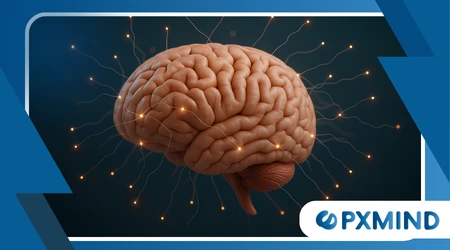The Brain on Stress: What Really Happens Inside Your Head

Brain on stress. Stress, in its essence, is the body’s natural alarm system. It’s designed to protect us from immediate threats, triggering a cascade of biological changes.
Anúncios
This ancient mechanism, vital for survival, now faces new challenges in our complex world.
When perceived danger looms, whether a snarling predator or a looming deadline, the brain orchestrates a rapid response.
This intricate process involves multiple regions, each playing a crucial role.
The amygdala, our brain’s emotional hub, is often the first to sound the alert. It quickly assesses potential threats, sending signals throughout the system.
Following this initial warning, the hypothalamus steps in. It’s the command center, activating the sympathetic nervous system. Think of it as flipping a switch for “fight or flight.”
This activation leads to the release of adrenaline and noradrenaline from the adrenal glands.
These powerful hormones instantly prepare the body for action, sharpening senses and boosting energy.
Cortisol, often dubbed the “stress hormone,” then enters the scene. While helpful in short bursts, its prolonged presence can have detrimental effects.
Its primary role is to sustain the body’s heightened state. It mobilizes energy reserves, ensuring you have fuel for the extended challenge.
The hippocampus, vital for memory and learning, is also significantly impacted. Chronic stress can even shrink its volume.
This shrinkage can impair our ability to form new memories and regulate emotions effectively. It’s a critical area for long-term well-being.
The prefrontal cortex, responsible for executive functions, also suffers. Decision-making, planning, and impulse control can all be compromised.
This region is crucial for our ability to think clearly under pressure. When stress takes hold, our logical processing often falters.
Consider a professional athlete during a high-stakes competition. Their initial stress response, a surge of adrenaline, enhances their performance.
However, if that stress becomes chronic, their focus wanes. Mistakes become more frequent, demonstrating the brain’s struggle under sustained pressure.
Chronic Stress: A Stealthy Saboteur of Neural Pathways
While acute stress can be beneficial, chronic stress tells a different story. It’s a relentless assault on the brain’s delicate balance.
Prolonged exposure to cortisol can lead to inflammation in the brain. This low-grade inflammation can damage neurons and impair communication.
It’s like a constant low hum of static disrupting a clear radio signal. The brain struggles to transmit information efficiently.
Neurotransmitters, the brain’s chemical messengers, are also thrown off balance. Serotonin, dopamine, and norepinephrine levels fluctuate erratically.
This imbalance contributes to mood disorders, anxiety, and even depression. The brain struggles to maintain its emotional equilibrium.
Read more: How Exercise Boosts Your Brain Power, According to Science
One striking example is the impact on neuroplasticity. This refers to the brain’s ability to reorganize itself by forming new neural connections.
Chronic stress actively inhibits this crucial process. The brain becomes less adaptable, making it harder to learn new skills or recover from adversity.
A study published in Nature Neuroscience in 2020 highlighted how chronic stress alters the morphology of neurons in the hippocampus, reducing dendritic complexity and spine density.
This research underscores the tangible, structural changes occurring in the brain on stress.
Think of your brain as a bustling city. Under normal conditions, roads are clear, and traffic flows smoothly. When stress hits, some roads close, others become congested.
With chronic stress, it’s as if major highways are permanently shut down. Essential connections are severed, hindering efficient travel.
This leads to a state of perpetual cognitive fog. It becomes harder to concentrate, and memory lapses become more frequent.
The sustained activation of the sympathetic nervous system also depletes the body’s resources. Fatigue sets in, further exacerbating cognitive issues.
Furthermore, chronic stress can suppress neurogenesis. This is the process of generating new neurons, particularly in the hippocampus.
Reduced neurogenesis means fewer new brain cells are available. This directly impacts learning and emotional regulation.

Table 1: Key Brain Regions and Their Response to Chronic Stress
| Brain Region | Primary Function | Impact of Chronic Stress |
| Amygdala | Emotion, Fear Processing | Heightened activity, increased anxiety |
| Hypothalamus | Stress Response Commander | Sustained activation of HPA axis |
| Hippocampus | Memory, Learning | Reduced volume, impaired neurogenesis |
| Prefrontal Cortex | Executive Functions | Impaired decision-making, reduced cognitive control |
| Nucleus Accumbens | Reward, Motivation | Reduced sensitivity to pleasure, anhedonia |
Building Resilience: Nurturing Your Brain’s Well-being
Understanding the impact of the brain on stress is the first step toward building resilience. It’s not about eliminating stress entirely, but rather managing its effects.
Engaging in mindfulness practices, such as meditation, can help regulate the amygdala’s activity. It fosters a sense of calm and control.
Regular physical exercise is another powerful tool. It reduces cortisol levels and promotes the release of endorphins, natural mood boosters.
Check this out: How Social Proof Influences Your Daily Decisions
A healthy diet, rich in antioxidants and omega-3 fatty acids, supports brain health. These nutrients protect neurons from damage and promote optimal function.
Adequate sleep is non-negotiable. During sleep, the brain repairs itself, consolidates memories, and processes emotions.
Lack of sleep amplifies the negative effects of stress. It creates a vicious cycle that further compromises cognitive function.
Social connection is also incredibly important. Strong social ties provide emotional support, buffering the impact of stressful events.
Connecting with others releases oxytocin, a hormone that counteracts the effects of stress. It fosters a sense of belonging and well-being.
Consider a student facing intense exam pressure. Instead of spiraling into panic, they practice deep breathing exercises.
This simple act can interrupt the stress response, allowing their prefrontal cortex to regain control. They can then approach their studies with a clearer mind.
Another example is a parent juggling work and family responsibilities. They prioritize a short, daily walk outdoors.
This not only provides physical activity but also a mental break, reducing the accumulation of daily stressors. Their brain on stress finds a much-needed respite.
A relevant statistic highlights the prevalence of stress-related issues:
According to the World Health Organization, depression and anxiety disorders are the leading causes of disability worldwide, often exacerbated by chronic stress.
++ How to Protect Your Peace in a Noisy World
This underscores the global challenge of managing the brain on stress.
Ultimately, empowering ourselves with knowledge about the brain on stress allows us to take proactive steps.
We can build a more resilient brain, capable of navigating life’s challenges with greater ease.

Mastering the Mind’s Response
The intricate workings of the brain on stress are a testament to our complex biology. From the rapid firing of the amygdala to the sustained release of cortisol, every aspect of our being is touched.
By understanding these mechanisms, we gain the power to mitigate harm and foster greater resilience. Do we truly appreciate the profound impact our daily stressors have on our most vital organ?
Frequently Asked Questions
Can stress cause permanent damage to the brain?
While chronic stress can lead to structural and functional changes in the brain, such as a reduction in hippocampus volume, many of these effects are reversible with effective stress management strategies and a healthy lifestyle. Neural resilience allows for some recovery.
How can I tell if stress is affecting my brain?
Common signs include difficulty concentrating, memory problems, irritability, anxiety, insomnia, and persistent fatigue. If you notice these symptoms, it’s important to seek professional support.
Does meditation really help the brain cope with stress?
Yes, studies show that mindfulness meditation can alter brain structure and function, strengthening neural connectivity and reducing amygdala activity. This improves the brain’s ability to regulate emotions and respond to stress more adaptively.
What is the role of diet in brain health regarding stress?
A nutrient-rich diet, including omega-3 fatty acids, antioxidants, and B vitamins, can protect the brain from oxidative damage and inflammation.
Processed foods and those high in sugar, on the other hand, can exacerbate inflammation and stress in the brain.
Is sleep really that important for a stressed brain?
Absolutely. During sleep, the brain recovers and reorganizes. Sleep deprivation increases cortisol levels and negatively affects cognitive functions, making the brain more vulnerable to the effects of stress. Prioritizing quality sleep is essential for brain health.
